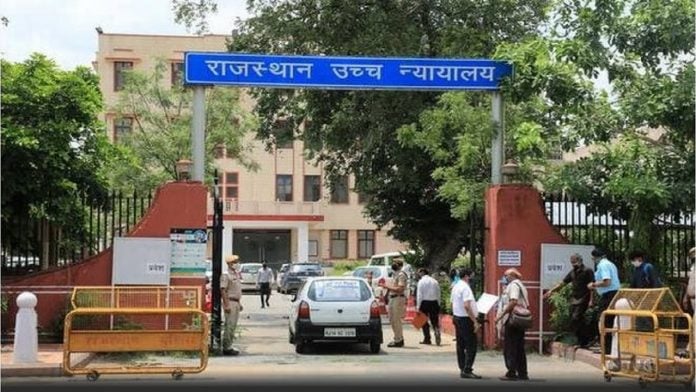The Rajasthan High Court has dismissed a Public Interest Litigation (PIL) seeking a direction that the respondents may be restrained from the erection of 132 KV supply line from within the residential area of Village Jeewana (District Jalore).
The petitioners from the village further sought a direction to shift the tower proposed in Village Jeewana just at a distance of 200 feet in the same land towards another khasra as it would not disturb the alignment of the proposed 132 KV supply line between GSS Khokha to GSS Jeewana.
P.R. Singh Jodha, the counsel representing the petitioners, vehemently and fervently contended that 132 KV Overhead Electricity Line is being installed, which may cause serious threat to lives of the villagers of Village Jeewana and their livestock and thus, a direction be given to restrain the respondents from erection of the supply line in question and further to change the alignment thereof.
The Division Bench of Justice R. Sandeep Mehta and Justice Kuldeep Mathur noted that laying of the Overhead Electricity Line is being undertaken by the respondents by taking recourse to the powers conferred under Section 68 read with Section 164 of The Electricity Act, 2003. Jodha, during the course of arguments, candidly conceded that Gazette notification in this regard, has been issued long back and the same is not under challenge in the petition.
“Nevertheless, his fervent contention was that as many villagers’ own lands directly underneath the overhang of the questioned supply line, it would pose a great threat to the lives of the petitioners and their likes and so also, to the livestock which grazes on these lands,” observed the Court.
The Bench has gone through the various title documents placed on record of the petition and observed that the entire chunk of agricultural land in question was owned by one Prakash Dewasi, who seems to have got it converted into Abadi category and thereafter, divided it into plots, and sold the same to various persons between the months of November 2021 to April 2022. As the Gazette notification authorizing the laying of the overhead electricity supply line has not been placed on record, it can be safely presumed that all these transactions must have been made after the issuance thereof.
“Apparently, thus, the instant writ petition seems to be nothing but a ploy of the land holders to somehow or the other, get the alignment of the Overhead Electricity Line changed.”
The High Court referred the case of the Gujarat High Court in the case of Gujarat State Energy Transmission Corporation Limited Vs. Ratilal Maganji Brahmbhatt (Barot) reported in AIR 2021 CC 1044 and the similar challenge laid by the land holder was repelled in the following manner:-
“…..Once the technical feasibility of the project, has been approved by the appropriateGovernment, by issuing an order under Section164 of the Electricity Act, 2003, no land owner or person interested can seek for shifting or realigning of the route, on the premise that the District Collector-cum-District Magistrate, has the powers to do so. The District Collector has no powers to alter any route or alignment, except to remove the difficulties faced by the licensee or the person authorised, pursuant to the orders issued under Section 164 of the Act.
58.17 If the intention of the Legislature was to seek for consent or permission from every owner and if the right of such owner has to be recognised, in terms of Section 16(1) of the Telegraph Act, due to resistance/obstruction, then the execution of any work or project, would be stopped at every stage. Needless to state that the execution of works, involving erection of towers and connection of overhead lines, is done, only after a detailed field study, by identifying a feasible route of the proposed transmission line,and while selecting suitable corridors, residential areas to be avoided, span length, the angle of deviation, extent of damage, likely to be caused,while erecting towers, maintenance cost of electric lines and towers and other factors, have to be considered. Public interest, in providing electricity to a large section of people and industrial establishments, etc., has to be given weightage over private interest.
58.21 Even if any Court issues any directions to consider the representation of any land owner or person interested, such directions are required to be considered only to the limited extent of payment of compensation, to be given by the licensee or the competent authority and the directions issued, if any, would not empower the District Collector-cum-District Magistrate, to pass any order, contrary to the orders, passed under Section 164 of the Act.(Emphasis supplied)…… ”
The Division Bench is of the firm view that the opinion expressed in the above judgment is the only acceptable interpretation of the law governing the field.
Since, the electricity transmission line is being laid in furtherance of a notification issued by the appropriate Government in this regard, and as the said notification is not even called into question, the Court would be loath to question the validity thereof. Furthermore, the alignment of the overhead line having been decided by the competent authority after following the due process of law, there is no reason to interfere therein while exercising the power of judicial review conferred upon this Court by Article 226 of the Constitution of India, the Court held.


